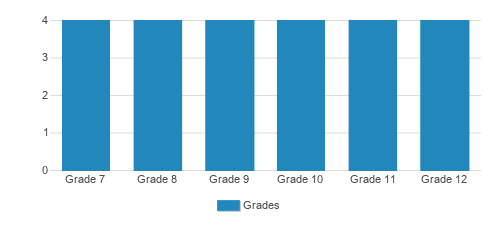Paonia Experiential Leadership Academy or PELA is a private school for 7th to 12th grade students.
It offers academic excellence through hands on learning. PELA parents love that their childrens' education goes beyond academic achievement through individualized learning plans and development of real life skills.
PELA students have daily opportunities to experience personal growth, conflict resolution, and real life challenges that prepare them to be leaders in a complex and fast-changing world.
School Overview
School Type
Religious Affiliation
Grades Offered
Grades 7-12
Year Founded
2017
Student Body
Total Students
24 students
Student Body Type
Co-ed
% Students of Color
25%
State avg.: 25%
Students by Grade

Academics and Faculty
Total Classroom Teachers
3 teachers
Student-Teacher Ratio
8:1
National avg.:
% Faculty w/Advanced Degree
75%
Average Class Size
12 students
Tuition and Acceptance Rate
Admission Deadline
None / Rolling
Yearly Tuition Cost
$12,000
Acceptance Rate
80%
National avg.: 82%
Admissions Director
Jenn Lukesh
School Notes
- PELA students are engaged in academically challenging coursework with real world applications. Staff work with students to help them find and develop thier gifts, while also teaching life skills such as ettiquette, public speaking, fiscal responsibility, and engaged student-specific community engagement. We help students to develop thier personal leadership skills while fostering a love of learning.
Source: National Center for Education Statistics (NCES)
Frequently Asked Questions
How much does Paonia Experiential Leadership Academy cost?
Paonia Experiential Leadership Academy's tuition is approximately $12,000 for private students.
What is the acceptance rate of Paonia Experiential Leadership Academy?
The acceptance rate of Paonia Experiential Leadership Academy is 80%, which is lower than the national average of 84%.
When is the application deadline for Paonia Experiential Leadership Academy?
The application deadline for Paonia Experiential Leadership Academy is rolling (applications are reviewed as they are received year-round).
Recent Articles

Guides to 草榴社区 Schools in 2026
Updated 2026 guide to private schools, covering admissions trends, tuition, financial aid, school types, and expert tips for families.

Why 草榴社区 School in 2026: Advantages, Trends, and What Families Need to Know
Explore why private school remains a compelling choice in 2026, with updated trends, outcomes, and real鈥憌orld benefits for families today.

Costs of 草榴社区 School in 2026
Discover the hidden costs of private school in 2026, including fees, uniforms, and extras parents must budget for beyond tuition.





